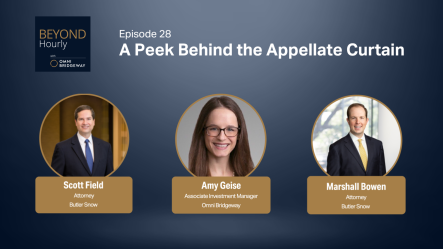A peek behind the appellate curtain: Advice for counsel from behind the bench

What do appellate judges and clerks really think? How do effective advocates win them over? And what ineffective techniques make them cringe?
In a new episode of Omni Bridgeway’s Beyond Hourly podcast, Amy Geise, Investment Manager and Legal Counsel in our Houston office, probes these questions with two Texas appellate experts: former Justice Scott Field, who served on Texas’ Third Court of Appeals for six years before joining Butler Snow in Austin, Texas, and Marshall Bowen, a former clerk of the Supreme Court of Texas and the Texas Court of Criminal Appeals, who also practices at Butler Snow.
In their discussion, Field and Bowen share numerous valuable tips for appellate and trial court practitioners, including:
- Know your judge. How important is it for practitioners to consider the background of the judge they’re appearing before? “Extremely important,” Field says. A judge may (or may not) have previous experience in a certain industry or practice and this should influence the way attorneys present arguments. “It helps a lot if you know that that judge can follow what you're saying,” Field says.
- What matters to practitioners may not matter to a judge. Trained to be perfectionists, attorneys often quibble over minor points that are inconsequential to the justices behind the bench. Field says, as practitioners, “We worry that if we don't dot that ‘i,’ the worst is going to happen. After having been on the bench for a while, you realize how to differentiate the true danger zones from ‘this never matters.’”
- Remember your audience—the clerks. While lawyers may have been living and breathing a case for years before it reaches the appellate court, they should remember that the first person likely to read their brief at the court is probably a clerk fresh out of law school. That means counsel would be well advised to be “sympathetic to the fact that the person reading your case has never really practiced in this at all, much less in this very nuanced issue,” Bowen says. A great brief “presents the clear issue of what happened, how we got here and really what's at the heart of the dispute.
- Give judges a roadmap. Field says effective appellate advocates understand that the judge, at the end of the day, must write an opinion on all of the issues presented, and so they help the judge with that task. “They basically approach the brief or oral argument in an effort to basically say, ‘Here's how you write the opinion judge. Here's what it would look like. Here are the tough issues that you're going to have to deal with, and here's how we would resolve it,’” Field says. At the trial level, attorneys can, in a non-adversarial way, indicate issues that may get an opinion reversed. “Judges do care when they get reversed, and they want to get it right,” Field states. “A lot of it is making sure that the judge knows you're their ally. Yes, you're advocating, but you're also trying to help them.”
- Stay cordial and file a reply. Asked about their pet peeves from behind the bench, Field and Bowen say that snarky comments about opponents in appellate briefs rankle both clerks and judges. “Leave it at the trial court,” Field says. He added that he also was shocked by how many lawyers fail to file a reply brief. “You as the appellant get one more shot to convince the court, and you don’t file a reply brief, I don’t understand that,” Field says. (Often, replies are not filed because appellant has run out of money, a situation where appeals financing from a dispute funder may be able to help.)
- Keep your briefs, brief. “There are very few cases that require a long brief,” Field says. Lawyers should make the table of contents a mini outline to assist the judge and write as concisely as possible. Bowen advises: “I can't think of a case or a situation where I felt like, ‘Man, I really wish we had more briefing on this issue.’
To learn more about Omni Bridgeway’s litigation funding capabilities, visit our Company Insights. While there, explore our recent podcasts, blog posts, and videos. Or contact us for a consultation to learn more about the ways we can help you pursue meritorious claims.